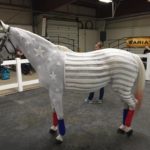Cloning your horse is no problem. But, don’t expect to register it with The American Quarter Horse Association any time soon. The 5th U.S. Circuit Court of Appeals in New Orleans ruled today that The American Quarter Horse Association may refuse to register cloned horses. The ruling overturns a lower-court decision from 2013 that had said the association had to admit cloned quarter horses to its breeding registry.
The type of cloning method at issue is called somatic cell nuclear transfer. It is the most common means of cloning and is the type used on Dolly, a sheep that represented the first animal ever cloned. A somatic cell contains the complete DNA of an animal. Scientists can extract and discard the DNA from an egg cell of a female donor (of the same species to be cloned) and insert the somatic cell from the genetic donor in its place. The modified egg will develop using the genetic donor’s DNA and can then be implanted into a surrogate mother.
If you’ve thought about cloning your horse, a company called ViaGen will do it for $150,000. That’s quite a bit for the average horse enthusiast, but if you compete your horse, it might just be worth it (moral issues aside). The Jockey Club, which is the breed registry for Thoroughbred horses in the United States, Canada, and Puerto Rico, is “dedicated to the improvement of Thoroughbred breeding and racing,” and expressly prohibits Thoroughbred procreation through any but natural means. HOWEVER, cloned horses are allowed to participate in the Olympics! In 2012 the Fédération Equestre Internationale (FEI), the international governing body for equestrian sport, announced a change in its position on cloned equine athletes. FEI veterinary director Graeme Cooke said in a statement, “An up-to-date review on cloning, resulting in an increased understanding of the technique, was presented to and debated at the FEI Sports Forum. The performance of a cloned horse is unlikely to match that of the original horse for a number of reasons…[and] as progeny of cloned horses will be produced by conventional reproductive methods, such as natural covering or artificial insemination, the FEI’s 2007 stated objective of maintaining fair play is upheld. The FEI will therefore not forbid participation of clones or their progenies in FEI competitions.”
When it’s all about the competition and money, it’s easy to look past some moral issues. But what about a recreational horse rider cloning their favorite pet? Do you morally have to wait until your original horse dies before “creating” its clone? If not, how would cloned horses interact with each other? If you created a clone after your original horse dies (using the DNA you harvested before he/she died) can you call the clone by the original horses name, or is that morally wrong and just too weird? A lot of the moral issues seem to come down to your original reasons for cloning your horse in the first place. Did you create a clone because you really like the traits, temperament, size, etc. of your original horse, or did you do it because you absolutely loved your horse and couldn’t imagine living life without him/her? Are either of those reasons really acceptable? At the end of the day, just because we can, should we?








